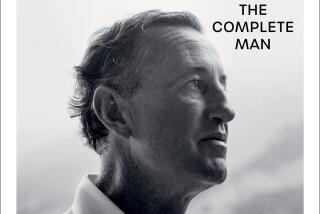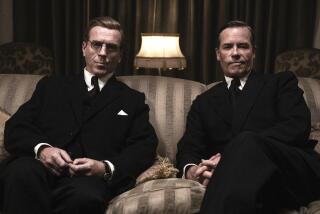‘3rd Man’ Spy Kim Philby, 76, Dies in Moscow
- Share via
Harold (Kim) Philby, the last surviving member of the triumvirate of spies who shook the British espionage system to its marrow 30 years ago, died Wednesday in Moscow. He was 76.
A British Foreign Office spokesman made the announcement in London, saying, “We were told by the Soviet Embassy that he died today (Wednesday). We don’t know what of, or how, or the circumstances, just that he died.”
The defection to the Soviet Union of British diplomats Guy Burgess and Donald Maclean in 1951 led to Philby’s discovery more than a decade later as one of the most important double agents in the history of espionage.
He had been a murky figure through his years of exile, surfacing only periodically and most recently in interviews last October on a Latvian state television station and again in February on a Moscow TV program dedicated to British author Graham Greene. Greene and Philby had been longtime friends and colleagues in British intelligence circles before Philby’s defection in 1963.
Harold Adrian Russell Philby--Kim (from the Rudyard Kipling tale) to almost everybody--was born in Ambala in India’s Punjab state to a father well-placed in the civil service hierarchy.
A shy youth who stammered, he entered Trinity College, Cambridge, in October, 1929, and graduated in 1933. There he was a classmate of Maclean and Burgess. Philby said he was recruited to communism and began his career as a Soviet agent the year of his graduation when he first was given the task of penetrating British intelligence.
For the next 30 years he was both a coveted leader of the British secret service and a “mole” for the Soviet Union, taking the heart of the secrets he learned as a senior British agent and passing them along to his Soviet contacts.
At the time of his undoing, Philby was so highly valued that he was being groomed to be chief of the esoteric MI-6 branch of the secret service.
Afterward, he would become known as the “Third Man,” the double agent who tipped off fellow spies Maclean and Burgess that they were under investigation by British authorities.
Worked as Reporter
Both fled to the Soviet Union, but Philby stayed on in his sensitive position until evidence gathered by a U.S. intelligence task force finally forced his removal from office. Afterward, he worked as a Middle East correspondent for the London Observer until the British themselves became convinced that Philby indeed was a double agent. He then followed Maclean and Burgess to the Soviet Union.
In April, Philby granted his first interview to a Western journalist. He told the Sunday Times of London that the reason his escape had been so easy was that British intelligence let him defect rather than face an embarrassing public trial.
Left in the wake of his departure were not only disclosures of the transmittal of wartime and postwar Allied secrets to Moscow but a lengthy chill on the exchange of intelligence data between London and Washington.
And the residue continued to linger. Years after Philby fled, it was revealed that Anthony Blunt, then the British royal art adviser, was a snared spy who had gone unpunished.
Immune From Prosecution
Blunt, who had achieved knighthood, had been given immunity from prosecution in exchange for his information about Philby’s role as a double agent. It was revealed that Blunt had been a key agent for the Soviet Union from the 1940s until his confession in 1964. But his role in the Philby-Maclean-Burgess triangle had been hidden until 1979, when it was disclosed by Prime Minister Margaret Thatcher.
Blunt died in March, 1983, in London, Burgess in Moscow in 1963, less than a year after Philby’s arrival there. Maclean also died in Moscow, in 1983. Maclean in particular went to a lonely grave. His wife had left him for an affair with Philby in 1957 and then returned to the United States, as had his children. Philby did not attend his funeral.
Philby maintained he was happier than his two former colleagues.
A British correspondent talked with him casually at Moscow’s Bolshoi Ballet in 1978 and quoted him as saying, “I don’t drink as much as I did in the Beirut days (when he was a correspondent). I’m fighting the battle of the waist.” But he said he had not quit smoking, declaring: “I’ve been smoking for 48 years, and I intend to smoke for another 48.”
He told the Sunday Times that he had found peace, that he was happy in his fourth marriage, to a Russian woman 20 years his junior, and that the Soviet Union had become home to him.
Kept His Subscription
But he maintained at least one small tie to his homeland: For many years, Philby kept a post in a central Moscow post office, where his subscription copies of the Times of London could be seen through a small glass window.
Philby had indeed been made comfortable in the land he once said he “considered to be my own ever since the 1930s.”
In July, 1963, one year after Philby’s presence in Moscow became known, the Soviet press reported that he had been made a Soviet citizen by a unanimous vote of the Presidium. His rank was that of a colonel in the Soviet secret police, the KGB. He later was awarded the Order of Lenin and the Red Banner and in July, 1980, was given the Order of Friendship of the Peoples for “more than 40 years of difficult but honorable work.”
Philby told his own story in 1968 in a stylishly written but distant book, “My Silent War,” in which he selectively described his life’s dedication to Soviet communism.
Called British Corrupt
In the book, published in the West with KGB approval, he condemned British intelligence for trying to undermine communism and said he saw British society as corrupt.
The preface of “My Silent War” promised a fuller account “in due course,” but none ever appeared.
Philby’s exploits earned him a place in literature as well as history.
Writers were fascinated by his experiences, particularly John le Carre, whose novels include “The Spy Who Came in From the Cold” and who acknowledged his debt to Philby for the idea of the “mole” used in his book “Tinker, Tailor, Soldier, Spy.”
A TV film about Philby, “Philby, Burgess and Maclean,” was produced in Britain in the early 1980s.
The introduction to Philby’s own memoirs came from Greene, his former associate in British intelligence. Greene said in March, 1981, that he had recently received letters from Philby regarding events in Iran and Afghanistan.
“I knew he was left-wing, but I didn’t know he was Communist,” Greene said, referring to their friendship of earlier years. “I respect his communism. He didn’t do it for money.”
In August, 1980, the weekly Nedelya published an interview with Philby in which he said that in his student days he became disillusioned by the oppression of workers, unemployment and the emergence of fascism in Germany and Italy.
‘Great Movement’
“I desperately sought the means to be useful to the great movement of the time, whose name was communism,” he said. “The realization of these ideas is the Soviet Union and its heroic people, which has laid the foundation of construction of a new world. The form of this struggle I found in my work in Soviet intelligence.
“I considered, and still consider now, that by this work I also served my own English people.”
Le Carre, on the other hand, once described Philby and the other privileged youth of his time as being “not only vain and secretive but a real brotherhood apart. . . .”
More to Read
Sign up for Essential California
The most important California stories and recommendations in your inbox every morning.
You may occasionally receive promotional content from the Los Angeles Times.










